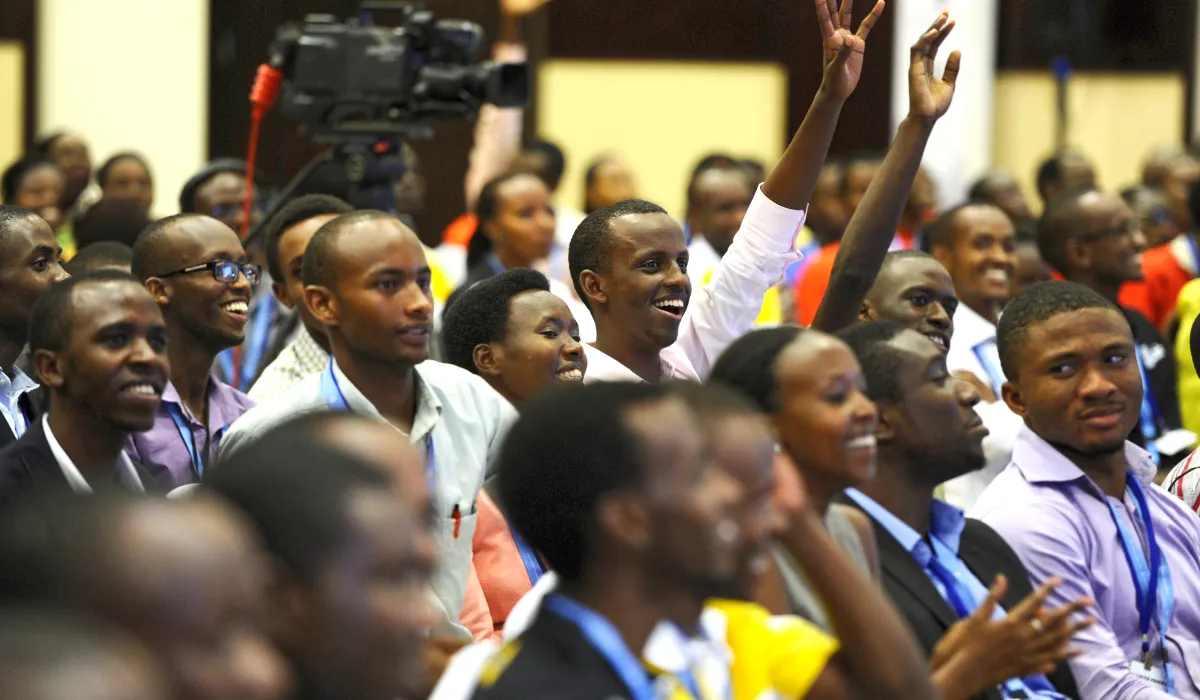Youth as a social barometer
The opinions and actions of African youth serve as a barometer for the political and economic vibrancy and potential of the continent. Their opinion is a measure for the failure or success of political systems.
From this perspective, the youth of the continent form an interest group that cannot be ignored. They hold the potential of transforming, rather than merely reflecting, the political realities of the continent.
The youth, democracy and elections
The Youth views democracy from its everyday utility – the difference it makes in their everyday life – which becomes the basis of their engagement and interaction. The African Union, through its Annual Continental Youth Consultation in 2021, noted that youth aspire to participate in democratic governance and the political process. When they are disenfranchised, they create their own platforms by utilising social media and other mediums of alternative convergence. Despite their efforts to proffer alternatives, the quality and sustainability of these initiatives can be fragile due to various constraints, including the high cost of data and state-sanctioned shutdowns. At the end of the day governments need to be changed, or re-elected, through the ballot box.
When Youth feel excluded from the democratic space, or that even if their participation makes no difference to their condition, then some may turn to alternative forms of social action. Others may abandon politics. Both harm democracy and the rule of law. An example of this experience is the Mungiki gang in Kenya, which originated from socio-political disenfranchisement. While this youth group is appreciated by some as a moral watchdog, its existence is at the junction between formal and informal politics as they are appreciated in one and accused in the other. Despite the outlook, the group commands and influences a critical mass and presents an alternative.
When Youth feel excluded from the democratic space, or that even if their participation makes no difference to their condition, then some may turn to alternative forms of social action.
Tweet
Coups, democratic shortcomings and the youth
Within this context of alternatives, it becomes important to pay attention to the emergence of coups in Africa which are often perpetrated by a younger generation. While presenting itself as an alternative, this trend has received divided support including celebration among segments of young people. The causes of these unconstitutional changes of government are varied including, disappointment with electoral democracy that either re-elects the same elites or when governments change, they fail to make any difference in the condition of the youth, There is also frustration with political interference in the armed forces and pervasive corruption, which is a risk to peace.
The recent frequent occurrence of coups in Africa, with seven taking place over the last three years, has sparked debates regarding the inability of democracy, as currently practiced, to remove political leaders, despite large-scale discontent. In an era where democracy predominates as the primary mode of power transition and administration, such discourse should ideally be unnecessary. However, the rise in coups and a number of other indicators underscores the necessity for introspection.
Youth action during times of political or constitutional crisis can either grant or strip away the veneer of legitimacy pursued in the moment.
Tweet
Centring the youth in conflict prevention
The youth as a critical mass could be at the centre of peaceful political transformation. As highlighted above, they have the potential to not merely reflect the society, but to transform it. When a coup occurs, it fundamentally violates constitutional principles, rendering it illegitimate. Firstly, it is fundamental for young people to recognise that aligning with such actions offers no assurance of improving their circumstances, and secondly that, suspending the constitution implies that there is no legitimate authority to hold the government accountable.
An alternative to coups is for the youth to become political change agents in the democratic process. The youth can play their civic role in society by utilising the power of their numbers. Africa has various platforms to promote and protect democracy and good governance, such as the African Charter on Democracy, Elections, and Governance (ACDEG), and the LOME Declaration, but these are powerless if they are not upheld and promoted by the electorate, and this is where the youth possess a distinct advantage.
Youth action during times of political or constitutional crisis can either grant or strip away the veneer of legitimacy pursued in the moment. Often during a coup, the armed forces orchestrating the action deliberately try to appeal to the Youth to gain their support in an attempt to sanitise their illegal take-over of government. In such moments, the youth ideally need to maintain a position that supports the rule of law and democratic principles. An example is the actions of the youth in the Zambia 2021 elections where they guarded their vote, ensuring that no electoral malpractice could take place thereby working within the law to deliver democracy.
The youth, in their collective strength, ought to reject being manipulated by the promises of the coup makers. Despite the seemingly attractiveness of short-term gains outweighing long-term benefits, it remains crucial for young people to help to protect the rule of law and the constitutional order. Furthermore, besides refraining from direct involvement in violence, it is equally vital to avoid disseminating and fabricating false information that could exacerbate an already tense environment and convince an unaware population. Through such actions, the Youth of Africa can become the drivers of a viable democratic process and the protectors of the rule of law. In that way they can be part of the system, rather than just onlookers cheering new military rule.
Kudakwashe Bandama is a Democracy and Governance consultant.


